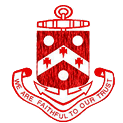Erasmus Smith Schools
Erasmus Smith Schools is an educational charity that was established by Royal Charter in 1669 after its initial foundation under Oliver Cromwell. It was known for many years as The Erasmus Smith Trust or as ‘The Governors of the Schools Founded by Erasmus Smith, Esquire’.
Erasmus Smith was a member of the Company of Grocers and as a trader he supplied Oliver Cromwell’s troops in Scotland and Ireland with cheese, oats and flour. He was also an adventurer – one of the many English merchants who had funded the Cromwellian campaign in Ireland. In the Settlement of Ireland he received, in return for the investment, confiscated lands and by further dealing acquired over 46,000 acres of land in several counties. Income from rentals was purposed to educate tenants and fund other charitable uses:
…Erasmus Smith reposeth in [the Trustees]…the great and ardent desire which he hath that the children inhabiting upon any part of his lands in Ireland should be brought up in the fear of God and good literature and to speak the English tongue
Foundation deed, 1 December 1657
Later, after the demise of Cromwell, he petitioned King Charles II to Charter the charity. The Charter required 32 Governors, which included politicians, businessmen, Protestant clergy and the Provost of Trinity College, Dublin. Their task was to use the money raised from the estates to establish five grammar schools and primary schools for the children of the tenants of the estates. Other ‘charitable uses’ which the revenue was used for included apprenticeships for boys; salaries for various Trinity College, Dublin Professors including Oratory, Hebrew, History, and Physics; exhibitions and scholarships for students at Trinity College; grants for tuition and accommodation at The King’s Hospital or The Blue Coat School in Dublin; and also providing an annual grant to Christ’s Hospital, London, England. Donations to TCD also helped in acquiring the Fagel Library in 1798 and the construction of several buildings on campus.
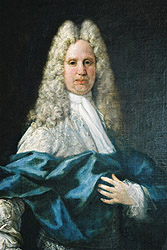
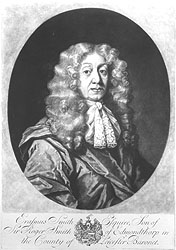
Left: Portrait of Erasmus Smith, oil on canvas, aged 79, private collection.
Right: Portrait of Erasmus Smith, School of Lely, mezzotint, courtesy National Gallery of Ireland.
The Grammar Schools
Grammar schools were established in Tipperary, Galway, Ennis, and Drogheda. Tipperary Grammar or The Abbey School, as it was known, passed out of the ownership of the Governors following legal action in the 1920’s and 1930’s. Ennis Grammar School, county Clare, had quite a short life span (1777-1890), after which the Ordnance Survey occupied the building. Galway Grammar School lasted for in excess of 200 years, closing in 1960. Drogheda Grammar School is still open today although it passed out of the control of the Governors in 1938, and is no longer in the original premises.
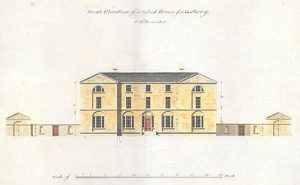
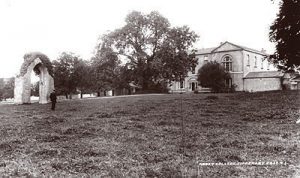
Left: Galway Grammar School (1715-1958), designs by Richard Morrison (1807). This building is currently being renovated to be used as private offices. Photo collection of Erasmus Smith Schools Archive.
Right: Tipperary Grammar School – The Abbey School (1760-1922), this building was burnt down in 1939 and the school was rebuilt on the same grounds under different governance. Photo courtesy of the National Library of Ireland.
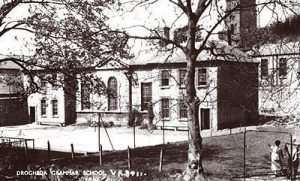
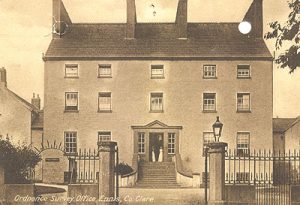
Left: Drogheda Grammar School (1680-1938), this building was demolished after the school had moved elsewhere in the town. Photo courtesy of the National Library of Ireland.
Right: Ennis Grammar School (1776-1891), the school has had several uses but is once again a school, housing Maoin Ceoil an Chair. Photo collection of Erasmus Smith Schools Archive.
The English Schools
The Board of Governors were also concerned with providing primary education, and gave grants, established or managed over 240 ‘English Schools’, distributed throughout Ireland. They were called English Schools because they taught entirely through the English language, but local people tended to refer to them as Erasmus Smith Schools. The first English School established was in Xelva (1776), Valentia Island, county Kerry, and the last one was in Ardee (1807), county Louth. The schools ran on the basis that the local community or patron would pay for half of the teacher’s salary, for half of any repairs and maintenance and for half of the books and equipment required for teaching. Many of these schools were established between 1810 and 1820, usually on the land of the main local land owner or on church glebe lands.
However, by the mid-1800’s the financial burden of the schools became so great that they were forced to cut back the number of schools in their care. The land acts in the 1880’s created difficulties for the patrons of the English Schools, as they were, more often than not, wealthy Protestant landowners. It was during this period that many schools closed or became National Schools. In the beginning, the English Schools were to provide basic education for tenants’ children and then other poor children in the parish, often both Protestant and Catholic.
In the later decades of the 19th century schools were mostly in outlying areas, where Protestant communities were very small, but where there was a desire that the children be given a Protestant education. Various grant schemes helped support the schools but direct management was minor and rare. Because of the wide dispersal of the English Schools, they are perhaps better known than the grammar schools in local communities.
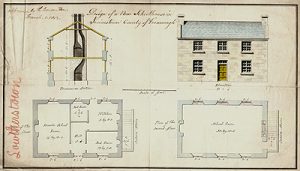
Above: Irvinestown or Lowtherstown English School, county Fermanagh (not dated but the school was sanctioned in 1812). The plans show elevations, floor plans and section (including the design for the chimney).
The Estates
The estates, which the Board of Governors managed and from which their income was derived, were situated in counties Limerick, Tipperary, Galway, Sligo, Louth, Westmeath and Dublin, with smaller portions of land elsewhere. The lands in the southern estates were very fertile, while land in Sligo derived its value from mineral deposits on Benbulben and the rights to hunting and fishing. The lands in Galway, however, were mainly urban, with a significant proportion of the town (e.g. Newtown Smith and Bohermore). A large amount of the Governors’ estates transferred ownership following the Irish Land Commission, and other parts were sold during the 20th century. Some titles still exist related to ground rents but are mostly inactive and not income generating.
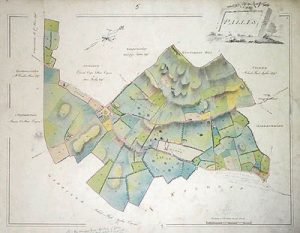
Above: Page from a map book bound volume titled ’Survey of the Lands of Pallis in the barony of Coonagh and the county of Limerick’, by Sherrard’s Brassington and Greene, 1818.
The High School
The High School, Dublin was established in 1870, not as a grammar school but as an intermediate or commercial school, with the aim of training boys for the civil service, colonial service, the army, the world of commerce and university – several exhibitions and scholarships were offered to Trinity College, Dublin. Its original building, which also contained the offices of the Board of Governors, was situated in 40 Harcourt Street, in Dublin’s city centre. Like many of the other city centre secondary schools, The High School, Dublin, moved out to more spacious grounds at ‘Danum’ in Rathgar in 1971. The school became co-educational in 1974 on its amalgamation with The Diocesan Secondary School for Girls, Adelaide Road, Dublin.
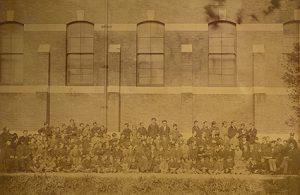
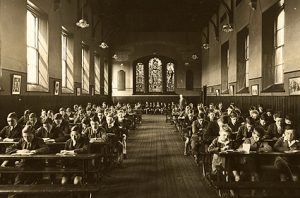
Above left: The first school photograph taken of the pupils and staff by the side of The Clockroom on the grounds at Harcourt Street, 1871.
Above right: The interior of The Clockroom, ca. 1950s.
Notable Past Pupils from The High School
Abrahamson, Lenny (HSD 1973-1983), film and television director, IFTA winner and Oscar nominated
Aikins, Kingsley (HSD 1951-1963), president and CEO American Ireland Fund and The Ireland Fund
Alton, Ernest Henry (HSD 1885-1892), classical scholar, public representative, and Provost of Trinity College, Dublin (1942-52)
Armstrong, Deirdre (HSD 1978-87), member of the internationally renowned band Kila
Armstrong, Harold Reginald (‘Reg’) (HSD 1940-1944), motorcycle champion and businessman
Beattie, John Hugh Marshall (HSD 1927-1933), social anthropologist
Burgess, William (HSD 1957-1963), former managing director IBM Ireland and IBEC vice-president
Burns, Ian (HSD 1967-1974), played for the Irish rugby team, member of the Board of Governors
Citron, Lana (HSD 1982-1986), author and script writer
Cox, Nigel (HSD 1966-1971), UK diplomat and civil servant
Dagg, Thomas Sidney Charles (HSD 1890-1891), civil servant, hockey player, and hockey administrator
D’Arcy, Charles Frederick (HSD 1870-1877), clergyman, theologian, botanist, and Archbishop of Armagh (1920-38)
Digges, Joseph Robert Garven (HSD 1871-1873), Anglican clergyman and beekeeper
Donaldson, Dr Alex, (HSD 1954-1960), veterinary researcher
Duggan, George Chester (HSD 1896-1903), civil servant London and Belfast
Ford, Alan (HSD 1963-1976), theology professor University of Nottingham
Ford, David (HSD 1955-66), Regius Professor of Divinity Cambridge University
Fox, Ian (HSD 1948-1958) broadcaster, music critic, lecturer
Gillis, Alan (HSD 1948-52) MEP and IFA president
Godsil, Arthur (HSD 1964-1972) former headmaster St Andrew’s College, Dublin and education consultant
Govender, S Thiru (HSD 1962-1969) pediatrics professor and clinical associate, University of Calgary
Hamilton, James (HSD 1955-1956) barrister, Director of Public Prosecutions
Hanly, Cuan (HSD 1975-1984) fashion designer
Hinds, Stephen (HSD 1968-1975) classics professor University of Washington, Seattle
Hughes, Arthur (HSD 1954-1956) physics professor University of Natal, Durban, South Africa
Hinkson, Henry Albert (HSD 1878-1882), novelist, barrister, and classical scholar
Jeffares, Alexander Norman (HSD 1930-1939), Yeats scholar, writer, professor
Jeffcott, Henry Homan (HSD 1892-1895), engineering professor and civil engineer
Johnston, David Maxwell (HSD 1946-1953) represented Wales against France at schoolboys level in 1955
Kilroy, Howard (HSD 1946-1952) CFO Smurfit Kappa and Governor of the Bank of Ireland
Kilroy, Norman (HSD 1950-1956) former chief executive Grafton Group, former chairman and member of the Board of Governors
King, Christopher (HSD 1966-1976) mathematics professor, Northeastern University, Boston
King, Desmond (HSD 1966-1975) politics professor and fellow, St John’s College, Oxford
Lyttle, Mark (HSD 1971-1981) Irish Champion Yachting and Olympian
Lumsden, Sir John (HSD 1882-1884), physician and founder of the St John’s Ambulance Brigade
Lyons, Francis Stewart Leland (HSD 1941), historian and provost of Trinity College, Dublin (1974-81)
Magee, William Kirkpatrick (‘John Eglinton’) (HSD 1881-1886), essayist and librarian
Maunsell, Robert Charles Butler (HSD 1887-1889), doctor, surgeon, president RCSI, lecturer
MacIlwaine, John Bedell Stanford (HSD 1870s), landscape painter and inventor
Mitchell, David Michael (HSD 1920-1927), physician, president RCPI, lecturer
Mitchell, Frank (HSD 1922-1930), environmental historian, archaeologist, geologist, president RIA
Moore-Lewy, Justin (HSD 1981-1986), talent and literary agent, film producer
Montgomery, Rory (HSD 1970-77), diplomat, ambassador, permanent representative to the EU, chair of the Press Council of Ireland
Murphy, Annalise (HSD 2002-08), Irish Champion Yachting and winner of a silver medal at the 2016 Rio Olympics.
Mayers (Ross), Catherine (HSD 1970-1975), Professor of Nursing, Toronto, Canada
McCracken, Brian (HSD 1946-52), barrister, Supreme Court judge, Chairman of the “Payments to Politicians” tribunal 1997
Noblett, William (HSD 1965-71), CPE, Chaplain to the Queen Elizabeth II and King Charles III, former chaplain to the RAF and Prisons
Norris, David (HSD 1956-63,) Joyce scholar, independent Senator and civil rights activist
Nowlan, David (HSD 1946-50), journalist, critic, medical doctor, managing editor Irish Times
Noyek (Noyk), Michael (HSD 1896-1901), solicitor and republican activist
O’Brien, Denis (HSD 1970-76), businessman and entrepreneur, founder and owner of Digicel as well as working with aircraft leasing, utilities support, energy and healthcare.
O’Connell, Frederick William (HSD 1890-95), clergyman and Irish-language scholar
O’Donovan, Grace, (HSD 1970-76), author, lecturer, ecologist
Ó Seireadáin, Cuan Barra (HSD 1995-2001), musician, curator at Conradh na Gaeilge
O’Sullivan, Chantal (HSD 1975-79), antique dealer with shops in Dublin and New York
Orr, David (HSD 1931-40), businessman, chairman of Unilever and of the British Council
Orr, Phil (HSD 1971-76), Irish rugby international with 58 caps, president of Old Wesley
Robbie, John Cameron (HSD 1967-75) Ireland international rugby union player, tv and radio presenter and commentator
Rodway, Norman (1938-46), accountant, teacher, university lecturer, and actor
Sargent, Trevor (HSD 1970-77), former Green Party politician and Church of Ireland minister
Schouten, Robert (HSD 1966-70), managing director ING Bank Amsterdam
Shatter, Alan (HSD 1960-69), author, solicitor, former TD and Minister for Justice and Equality
Stevenson, Walter Clegg (1888-95), surgeon and pioneer in radium treatment
Thompson, Edward Arthur (1925-32), classicist and historian
Thompson, Simon (HSD 1973-84), headmaster of the British School in Geneva, Switzerland
Thrift, William Edward (18790-89), academic, politician, and Provost of Trinity College
Vaux, Alan (HSD 1962-68) Dean College Liberal Arts, Southern Illinois University
Warnock, William (1922-29), linguist and diplomat
Walton, Bernard (HSD 1966-72) wildlife film and TV producer
Went, David (HSD 1958-65), CEO Irish Life and Permanent
Willis, Robert (HSD 1935-41), director of CRH, Irish Life and Banque Nationale de Paris
Woods, Stanley (HSD 1915-20), world champion racing motorcyclist
Yeats, William Butler (HSD 1881-83), poet and playwright
Young, Ian (HSD 1975-76), managing Director Irish International Group
